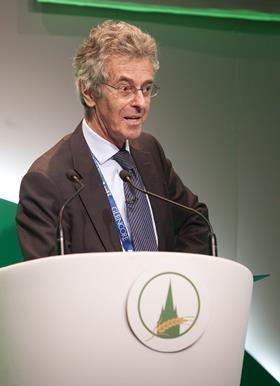
Climate change:
The biggest risk to UK agriculture from climate change will be too little, or too much water, soil erosion, and new plant diseases, the keynote speaker at the Oxford Farming Conference has warned.
Former Defra advisor Lord John Krebs, who gave the Frank Parkinson lecture on ‘climate change: challenge or opportunity’, discussed the impact of climate change on farming.
“Very large, irreversible changes to the earth’s climate will occur if temperature rises more than two degrees. At the moment, our grandchildren could face increases of up to three degrees,” he said.
“We need to cut emissions from agriculture by a quarter by 2013. This can be achieved through precision agriculture to create clever use of fertiliser.” But, he added, agriculture will have to adapt even if it does reduce emissions.
According to Krebs, GM is a “big opportunity” and could bring benefits to farming and the environment, although he warned it is “no magic bullet”. “We need more ecological thinking alongside genetics, molecular biology and big data. Precision agriculture needs to be better harnessed,” he said.
“The most severe impact will be flooding in coastal areas and extreme heatwaves. Although the climate change impact in the UK may be less than in the Mediterranean, so there could be opportunities for UK agriculture.”
Europe:
Leaving the EU would gamble with the livelihoods of farmers and food producers who would be unable to compete with countries still receiving CAP subsidies, the UK’s longest-standing environment minister has warned.
Richard Lochhead, member of the Scottish Parliament, used his talk at the Oxford Farming Conference to warn farmers that a vote to leave the European Union following a referendum could see them lose the “protective shield” of CAP payments.
Although the fresh produce business is less dependent on CAP payments than other agri-industries, Producer Organisations are able to draw down funding from the EU for marketing, which would be lost if the UK exited the EU.
Politicians, including current Defra minister Liz Truss, were grilled on their party’s stance on the European Union ahead of May’s general election.
“We want the benefits of the single market without the cumbersome costs that come with it at the moment. We are negotiating very hard for the best deal, but if we don’t get what we want we are prepared to consider all options,” said Truss.
Conference chairman Richard Whitlock continued: “I think British farmers would like to know what would happen if Britain left the EU.”
Truss replied: “This is a very hypothetical situation. But we need to make sure farmers have a level playing field. We would look to protect farmers whatever the situation.”
Labour MP and shadow minister for Defra, Hugh Irranca Davies, said: “I am utterly convinced of the benefits, not just to food security and economics, but to the environment, of staying in the European Union. We can actually get a hell of a lot out of it, if we are prepared to give it some welly.”
But Lochhead said the Conservative Party has been phasing out direct payments to farmers over the past few years, and if the UK left Europe then British farmers would no longer receive CAP payments and would be “at the mercy of the Westminster treasury”.
Supply chain:
Shortening the supply chain does benefit growers and offer opportunities to save cost, according to Poupart Group chairman Laurence Olins.
Olins, who spoke at the Oxford Farming Conference, said reducing the number of processes in the supply chain is better for the producer, although a shorter chain is “not without its difficulties”.
His talk, entitled ‘Are shorter supply chains really benefiting farmers?’, examined three types of supply chain management in the fresh produce business: management by retailer, management by an intermediary, and joint management.
He said management done solely by the retailer is best suited to larger growers with simpler ranges. “The biggest challenge for the producer in this situation, is that with only one customer, you have no access to information about the whole marketplace,” he said. “The grower is in danger of making the wrong decision about promotions, capital investments and pricing.”
Intermediary management by a packer, exporter or marketer, “clearly adds costs”, said Olins, although they do benefit members by owning unique varieties or branded products.
And he said joint management, such as Asda’s IPL or Tesco’s GFS model, is still in a very fluid state and has seen some complexities enter the chain.
“It’s plain to see that shortening the supply chain has been of benefit to the producer and the retailer, although the benefits are not always shared equally.
“There is no one set way of supplying fresh produce to the multiple retailers. Producers should make the choice of customer and supply chain carefully and seriously,” he said.
Who said what:
Asked what kind of farmer she would be, Defra minister Liz Truss replied: “Horticulture does really interest me. I have spent time on pea vining farms in north Norfolk, and I am fascinated by radish and Fenland celery production in the Fens.”
UKIP spokesperson for agriculture, Stuart Agnew, summed up the nation’s view on anaerobic digestion. “AD is marmite. You either like it or you really dislike it.”
Defra minister George Eustice shocked delegates with a ground-breaking bit of news. “I used to be a fruit farmer,” he said. “And let me tell you, blackcurrants need light to grow.”
Conference chairman Richard Whitlock lamented the use of Defra as a platform for aspiring ministers. “The Conservatives have traditionally used Defra as a transitional department, judging from the turnover,” he said.
Huw Irranca-Davies, Labour MP and Defra shadow minister, said: “We do believe GM could provide part of the solution to food security.”



